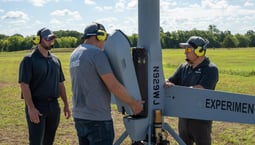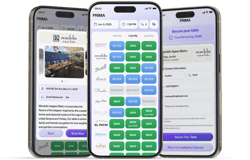WHAT YOU’LL DO:
- Develop and implement advanced sensor algorithms for processing data from IMUs, radar, cameras, GPS, and other sensors.
- Enhance state estimation algorithms by integrating multi-sensor data for improved accuracy and robustness.
- Design and implement real-time sensor data processing pipelines.
- Collaborate with cross-functional teams, including software engineers, autonomy researchers, and hardware engineers, to ensure seamless integration of state estimation algorithms.
- Conduct experiments and field tests to validate the performance of state estimation algorithms in real-world scenarios.
- Stay updated with the latest advancements in sensor technologies and state estimation , applying them to our systems.
REQUIRED QUALIFICATIONS:
- Typically requires a minimum of 5 years of related experience with a Bachelor’s degree; or 4 years and a Master’s degree; or 2 years with a PhD; or equivalent work experience.
- Experience developing and deploying real-time sensor processing algorithms, e.g. with cameras, radar, IMUs, GPS, etc.
- Solid understanding of state estimation techniques, such as Kalman filters, particle filters, etc.
- Experience with C++ 11 or newer
- Experience with Linux, command line tools, etc.
- Excellent communication skills, with the ability to effectively collaborate with multidisciplinary teams and external stakeholders.
- Proven track record of successfully shipping products, showcasing the ability to navigate through development cycles, overcome obstacles, and deliver high-quality solutions to meet project deadlines and exceed expectations in a fast-paced environment.
- You have a demonstrated record of working hard, being a trustworthy teammate, holding yourself and others to high standards, and being kind to others.
PREFERRED QUALIFICATIONS:
- Experience in implementing inertial navigation algorithms on real-time processing systems
- Knowledge of computer vision techniques
- Proficiency in optimizing algorithms for compute-constrained systems
- Experience with CUDA or other hardware acceleration technologies (e.g. FPGAs)
- Proven track record of transitioning from R&D to production
Top Skills

What We Do
Founded in 2015, Shield AI is a venture-backed deep-tech company with the mission of protecting service members and civilians with intelligent systems. Its products include the V-BAT and X-BAT aircraft, Hivemind Enterprise, and the Hivemind Vision product lines. With nine offices and facilities across the U.S., Europe, the Middle East, and the Asia-Pacific, Shield AI’s technology actively supports operations worldwide.
Why Work With Us
What makes Shield AI special is our people. We unlock the power of autonomy, and in the face of overwhelming odds and challenges, we find ways to win and make a difference for our customers. We bring together software, AI, and aerospace engineering disciplines to deploy the most intelligent aviation capabilities in the world.
Gallery



.png)







